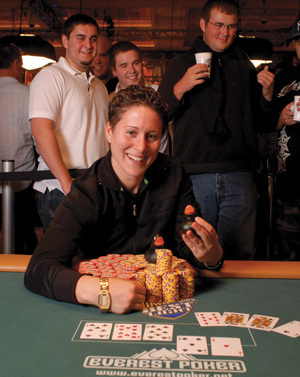 loading
loading
Where They Are NowJackpotOne of the world's best poker players heads to law school.  Matt MathisVanessa Selbst ’05 shows off her chips (and the toy ducks she brings as good-luck charms) after winning an event at the World Series of Poker in June. View full imageOver the past year, Vanessa Selbst ’05 has worked to improve economic opportunities in poor neighborhoods as an intern at a small Brooklyn-based nonprofit. But that was just her day job. Moonlighting as one of the world's best poker players, she won an event (pot-limit Omaha, for those who know enough to ask) at this year's World Series of Poker in Las Vegas. She matriculates at Yale Law School this fall. Y: Is law school going to put an end to your poker career just as it's heating up? S: No way. I'm going into public-interest law so I'm not planning on working 80- or 100-hour weeks. I'll still have time for poker. Y: Public-interest work seems pretty far from the money-oriented world of poker. How do you right those in your mind? S: It's a really interesting dynamic. At nonprofits every dollar counts -- you really have to pinch pennies to make things work. And then I get on a plane and go to Vegas and it's the world of excess, and the whole point is to spend tons of money. But when I'm playing poker, I'm not really looking at the chips as money -- I'm just playing a game, even though there's hundreds of thousands of dollars on the line. I just separate those worlds in my mind. But nonprofit jobs don't pay very much, so poker is a way of supplementing my income. Y: You tried your hand at a high-paying job. S: I worked for [the management consulting firm] McKinsey for six months. It was like poker -- it was all about making the most money, except it wasn't a game. Everybody was working hard to do it. At least in poker it's fun. Y: Now that poker is televised, everybody knows that you just won over $350,000 at the 39th World Series of Poker in Vegas. Do you have groupies? S: I have a lot of women who come out to support me, because there aren't many women who are actually good at the game. Y: Why is that? S: Poker is a male culture. It's a night out with the boys while the women stay home and do their nails. I don't think that women are naturally worse at it. I guess men tend to be slightly statistically better at math and science so they might have some edge. But the main thing is how it is perceived. Y: Do you experience more pressure as a female player? S: I feel less pressure. There's less expected of me. If a woman makes a dumb move in televised play, the online poker forums don't criticize the move. They'll say, “It's okay, she's hot” or that her boobs are too small. The whole discussion will be about how she looks. They don't actually expect a woman to be able to play. Luckily, I can, so I get more respect than I'm probably due. Y: How does television affect poker? S: It's interesting what it does to the female players. The guys are all scraggly and unshaven, but all the women are wearing their best Sunday dresses. It's their shining moment. It's really annoying. Y: What do you wear? S: For my last televised match, I wore a crazy shirt with a skull on it made out of rhinestones. Y: In the past decade, competitive poker has moved into the mainstream. Is that good or bad? S: It's great for me. It brings in more players, and the money trickles up to the best players. And it improves the public perception of poker players, so that now I can write on my law school application that I play poker and not just be seen as a gambler. Y: Poker helped you get into law school? S: Yeah, I wrote my application essay about how I wanted to apply poker strategy and logic to the legal problems facing nonprofits. And I got in. Y: You did improv comedy as an undergrad. Does that feed into your game play? S: I'm taking improv comedy classes here in New York right now, and I've done some sketch comedy classes as well. It helps me see the humor in hanging out with a bunch of poker-playing degenerates all day. I make fun of them a lot. Y: Does that get you in trouble? S: I got a death threat once. Y: For real? S: It can get pretty heated. Fights break out all the time. When there's a lot of money on the line, people can get very serious. Plus, a lot of them don't have a good sense of humor. I don't think I've ever been at a poker table where there hasn't been at least one argument. You think about your normal life -- how often do you have shouting matches with people? I'd say I get through 95 percent of my days without ever having a conversation where that occurs. But at a poker table, that just happens all the time. Y: Is it stressful? S: Not really. I just roll with it.
The comment period has expired.
|
|